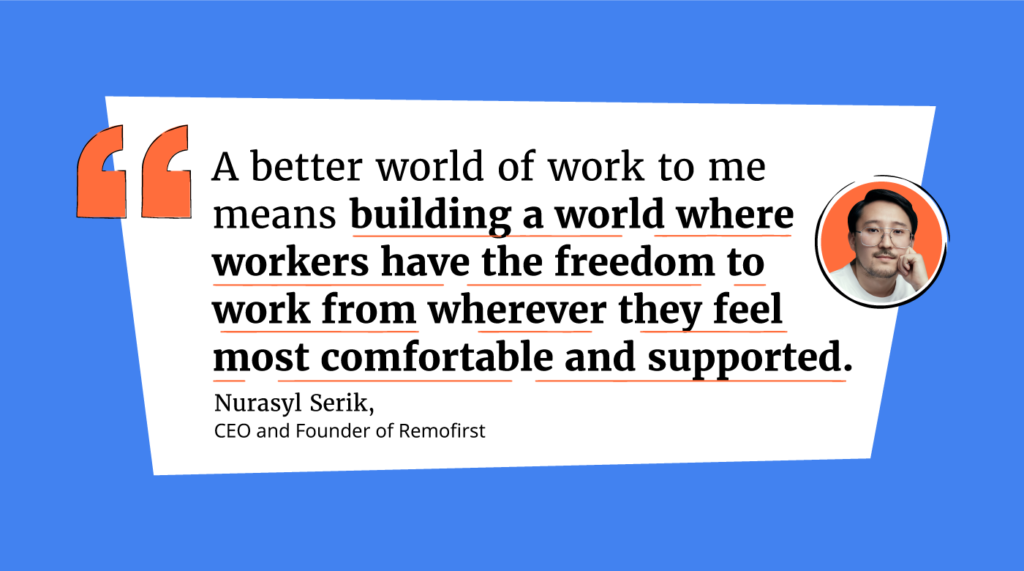We’re passionate about the world of work, and how we can make it better. To help satisfy our curiosity, we’ve launched an interview series where we pick the brains of experienced leaders, business owners, managers, and individual contributors to get their thoughts on how we can collectively build better workplaces.
We’d love to get to know you a bit better, tell us a bit about your backstory.
I'm originally from Kazakhstan, and have lived most of my life in the UK. I got into the Remote Work space about 6 years ago, about 4 years before it became a trend. My co-founder is from Ukraine, and when we were starting companies in the UK we were bootstrapped, so a way to save on costs was to be remote-first.
Many of our initial startups failed, but we had one successful exit with Felix Math which was an AI math product. With that product you could take a picture of any math equation and it would give you a step-by-step solution in seconds.
We realized there that one of the biggest challenges we had as remote-first companies was hiring people around the world in a compliant way. We tried some legacy solutions but they weren’t quite tech-savvy or fast enough for our needs.
We didn’t know why global payroll was so painful in this day and age, and that served as a big motivation to tackle this industry and build something that we could use ourselves. So in that way, we kind of became our own first customer as it was a pain we had always felt.
Once we sold that company, I became a product manager at a company called Job Today where I led the division that built out payroll in the UK. That was my first experience building out a payroll system, and after that I felt inspired to try to build the next generation of global payroll systems for the future of work.
If we were to ask a friend to describe your personality to us, what would they say?
Work obsessed person with crazy ideas and customer centric focus!
Thinking back to your career journey, what’s an interesting story that stands out?
I’ve started around 5 startups, most of which have failed—which is just to say I am not afraid of trial and error. I know that not every business idea will change the world, but it’s everything I learned from those ideas that have helped me create Remofirst. I think most people might have thrown in the towel after the first few that failed, but I’ve used those experiences as learning opportunities to help me grow as a startup founder.
What’s the most impactful lesson you've learned over your career thus far?
I often say—just keep swimming! I believe it’s all about not giving up and constantly iterating.
Thanks for giving us some insight into who you are! Let’s jump into things. When you hear the phrase “build a better world of work”, what comes to mind?
For me, I think of freedom of work. The new working world that we are currently living in is very different from what it was 10 years ago. It’s no longer considered “the norm” to commute 2 hours/day and spend 10+ hrs each day away from our homes and families.
An overwhelming percentage of workers want the freedom to work from home (or wherever they choose to work), rather than being mandated to work from a shared office space 5 days a week.
According to a survey by McKinsey, 87% of respondents choose to work remotely at least part of the week when given the option. We’re seeing with some bigger companies like Apple that the strict return-to-office model is making employees upset and likely causing them to lose access to great talent—as opposed to companies like Spotify who have seen lower turnover and increased diverse representation since announcing their “work from anywhere” model.

Whether that be in their living room, their parents’ house, across the world, etc.
For you, what’s the main blocker you see as standing in the way of building a better world of work?
The main blocker I see right now are companies who are solely focused on returning to the old way of work. I believe we are past the point of geographically-tied office spaces and talent pools,
Any company who doesn’t see the benefits of accessing global talent with remote work is going to be left behind.
What’s one thing within our control that we can practically do to build a better world of work today? And, how do you recommend going about it?
I think it’s become very easy for companies to offer flexible work options to their employees. Doing this is such a simple way to increase your employee happiness and lower your turnover rates, and you can do so while still keeping an office space where your employees have the option to meet and gather once in a while.
It’s no secret that employees with flexible work options tend to be happier, so why wouldn’t you want to offer this option to your employees?
Given how easy it’s become to work asynchronously across the world, it’s my opinion that this is where our better world of work is headed.
Can you share one thing you’ve experienced, seen, or read about that is leading us towards a better world of work?
The rise of global payroll and Employer of Record solutions is helping accelerate the adoption of remote work by empowering employers to be border-less in their remote hiring. The process of hiring remote workers around the world is going to become much easier than we can imagine.
I’m curious, thinking about building a better world of work, is there a company and/or leader who stands out to you as someone we should follow? If so, what are they up to?
There are a few big companies that have been ahead of their time when it comes to being remote-first. I would say Zapier, Automattic, and GitLab have done a tremendous job at documenting their remote work processes and sharing it with the rest of the world.
How can our readers follow your work?
They can follow me on Twitter (@nsremote), LinkedIn (Nurasyl Serik), or visit our website remofirst.com where we write a lot of content about remote work.
Thank you for adding your voice to the People Managing People's interview series on How to Build a Better World of Work!
Add Your Voice To The Conversation
Join our interview series and share your ideas for how we can build a better world of work.


